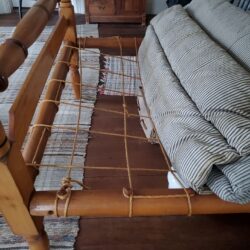Phrases of History
In our daily interactions with others, many of us spontaneously use phrases to describe something, but have little idea where those phrases originally came from. We often use idioms, metaphors, or even a few random words strung together that we’ve heard other people use, but not know how those words ever evolved to become popular phrases. As it turns out, many of the modern phrases we use today can be traced back to historical origins, with stories much deeper than what we attribute to them in present-day conversation.
“Sleep Tight; Don’t Let the Bedbugs Bite.”
This is a phrase that many of us are familiar with. Often used to humorously wish someone a good night’s sleep, the first part of this phrase is actually much more literal than we might think. The modern phrase is used as a historical reference to the Victorian era, specifically regarding the stiff ropes that were connected to the frame of a bed in an array and that supported the mattress underneath. Logically, these ropes would need to be adequately tightened before sleeping in order to support both the mattress as well the person on the bed, hence the first part of the phrase: “sleep tight.”
Below is an example of such a sleeping arrangement that is located in one of the Jordan House Museum’s bedrooms:
The second segment of the phrase, “don’t let the bedbugs bite,” is equally, if not more, literal than the first, and, as you can imagine, probably not in a good way. In the Victorian era, modern pillow stuffing had not yet been prevalent, and many Victorians had to make do with other means. They often stuffed their mattresses with natural materials, including straw, corn husks, or feathers (Karstensen). These steps would be taken in preparation for winter each year, and there would often be little time to fully clean these materials before filling the mattresses with them. Bedbugs were naturally attracted to these materials, even more so due to their uncleanliness, and this phrase consequently emerged.
“Spill the Beans.”
This phrase has an incredible history, one that many of us may have little prior knowledge of. In modern usage, many of us use this phrase to indicate the revealing of secret information, be it intentionally or by mistake. One of the most common explanations of how this phrase evolved can be traced from, surprisingly, a popular voting system from ancient Greece. In order to cast a ballot, Greek civilians would drop either a white or black (or another darker color) bean into a jar to indicate their support or rejection, respectively, for a particular candidate (Wahl). If the jar was tipped over by mistake, or perhaps purposefully, the beans would spill out and ballot results would be revealed, as Madeline Wahl describes, “prematurely” (Wahl). It is a common belief that the phrase evolved from its relation to this specific system.
“Show your True Colors.”
This phrase is used in many different contexts today. It can be used in a positive context, meaning to show your true personality with pride. However, the context with which this phrase originated is often seen in a more negative light. In maritime battles of the 18th century, the country that a ship represented was often displayed by means of its projected flag, which was required by all ships in order to inform surrounding ships of one’s identity and was often referred to as a ship’s “colors” (“Sailing Terms”). However, some deceptive captains used this rule to their advantage, by displaying a false flag in hopes of convincing nearby ships that they were their allies, when they were really their enemies (“Sailing Terms”). This dishonest practice allowed for a military advantage, as these ships could come in close proximity to their enemies without being attacked, while giving themselves the ability to strike first (“Sailing Terms”). It is incredibly interesting to see how the context in which this phrase is used has evolved over time, and how modern conversation has grown to implicate it.
It is essential to understand the origins of such phrases, in order to fully comprehend how the phrase came to be in the first place, as well as its implications in modern conversation. Whether it be ancient Greece or the naval battles of the 1900s, historical phrases have a deeper history than what we might initially see on face.
References:
Karstensen, Rebecca. “Sleep Tight, Don’t Let the Bed Bugs Bite – A Myth Debunked.” Wylie House News and Notes, Indiana University Bloomington, 18 Jan. 2018, blogs.libraries.indiana.edu/wyliehouse/2018/01/18/sleep-tight-dont-let-the-bed-bugs-bite-a-myth-debunked/. Accessed 14 Mar. 2021.
Wahl, Madeline. “Where Does the Phrase ‘Spill the Beans” Come From?’ Reader’s Digest, Reader’s Digest, Updated 26 May 2020. www.rd.com/article/spill-the-beans-meaning/. Accessed 14 Mar. 2021.
“Sailing Terms and Their Origins: Showing Your True Colours.” Asia at Sea, www.asiaatsea.com/sailing-terms-and-their-origins-showing-your-true-colours/. Accessed 14 Mar. 2021.



